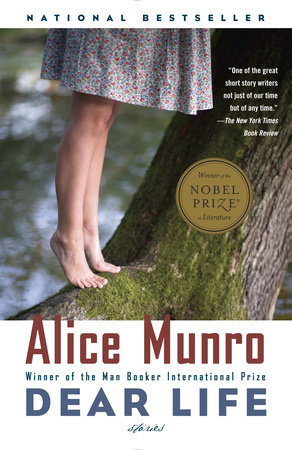Reading Group Center
- Home •
- Books by Category •
- Imprints •
- News •
- Videos •
- Media Center •
- Reading Group Center
Dear Life Marks Extraordinary Autobiographical First for Alice Munro
“I believe they are the first and last—and the closest—things I have to say about my own life.” Those words introduce the last four works of Dear Life, Alice Munro’s newest and perhaps most revealing collection of transcendent short fiction. The four stories, or remembrances, constitute a coda that, in Munro’s words, “is autobiographical in feeling, though not, sometimes, entirely so in fact.”
The stories may not be completely factual, but they do what the author’s done best throughout her 14 collections of short stories: capture the quiet, true, and sublime moments that come to define a life. As Charles McGrath writes in his review at The New York Times, Munro’s stories embody a vision of life that is “precious but also costly and so unpredictable it’s all one can do to hang on.”
Being “autobiographical in feeling” rather than fact is in keeping with Munro’s vision for the short story. “The deeper theme here, as so often in Munro’s work, is memory itself and its selectivity and unreliability, its falseness even,” McGrath says.
Dear Life is perfect for any book club looking to branch out into short fiction; Booker-prize winner Munro is one of the form’s greatest masters, and this collection’s stories lend themselves to endless re-readings and discussion. After decades of bringing her considerable powers of imagination and empathy to bear on animating her characters, it’s wondrous to read as Munro focuses on her own, dear life, turning it into something every bit as engrossing—and improbable—as fiction.


